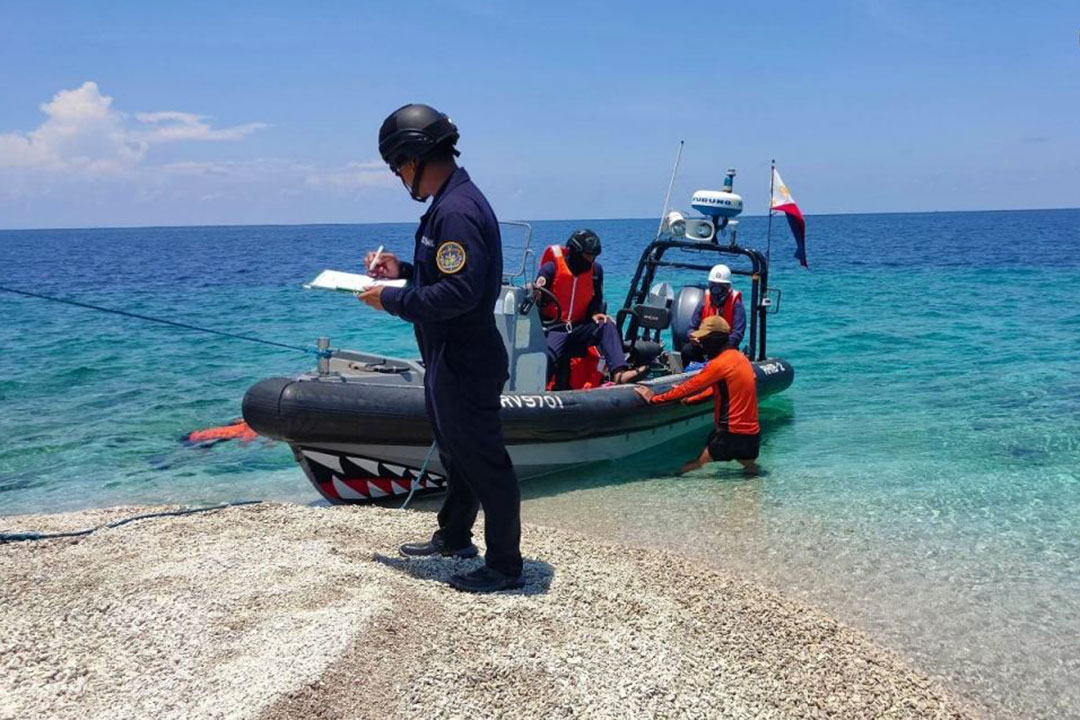Philippines says it will block Chinese reclamation at disputed Sabina Shoal

THE PHILIPPINE Coast Guard (PCG) will keep its presence at the disputed Sabina Shoal in the South China Sea to prevent China from carrying out reclamation activities in the area, its spokesman said on Monday.
The PCG has been effective in deterring China from doing small-scale reclamation, spokesman Jay Tristan Tarriela told a news briefing on Monday. It had not documented any activity from the Chinese vessels present at Sabina Shoal since it deployed its multi-role response vessel there in mid-April, he added.
He said the Coast Guard had to make sure it was able to prevent “China from carrying out a successful reclamation [at] Sabina Shoal,” which Manila calls Escoda.
Located within the Philippines’ exclusive economic zone, the shoal is the rendezvous point for vessels carrying out resupply missions to Filipino troops stationed on a grounded warship at Second Thomas Shoal, where Manila and China have had frequent maritime run-ins.
China has carried out extensive land reclamation on some features in the South China Sea, building air force and other military facilities, causing concern in Washington and around the region.
“China does not want to get caught,” Mr. Tarriela said.
China’s Foreign Ministry urged the Philippines to stop making irresponsible remarks and to stop trying to mislead the international community.
The Philippine Coast Guard on Saturday said it had deployed a ship to Sabina Shoal, accusing China of building an artificial island amid an escalating sea row, adding that two other vessels were in rotational deployment in the area.
Since the ship’s deployment in mid-April, the coast guard said it had discovered piles of dead and crushed corals dumped on the sandbars of Sabina Shoal, altering their sizes and elevation.
“China has indisputable sovereignty over the South China Sea islands and the adjacent waters,” the Chinese Embassy in Manila said in a statement on Sunday.
China claims almost all of the vital waterway, including parts claimed by the Philippines, Brunei, Malaysia, Taiwan and Vietnam. A United Nations-backed tribunal based in the Hague in 2016 ruled that China’s claims had no basis under international law, a decision that China has rejected.
‘ALARMED’
Meanwhile, Stanford University’s Gordian Knot Center for National Security Innovation said China deployed a huge force to Scarborough Shoal ahead of a Philippine civilian mission to the traditional fishing ground in the South China Sea.
Four coast guard vessels and 26 large militia ships from China are expected to be on blockade on Tuesday morning, Gordian Knot Center fellow Raymond M. Powell said in an X message.
“This will be by far the largest blockade I’ll have ever tracked at Scarborough,” he said. “China seems determined to aggressively enforce its claim over the shoal, of which it seized control from the Philippines in 2012.”
Despite the heavy presence of Chinese vessels in the area, Atin Ito Coalition said its second civilian supply mission to Scarborough Shoal would proceed on May 14-17.
The activity is a “legitimate exercise of Filipino citizens’ right to movement within our own territory,” Atin Ito co-convenor and Akbayan Party President Rafaela David said in a statement.
“China’s actions are failing to intimidate Filipinos. Instead, they are only uniting and inspiring us to go further in defending our rights,” she said.
“Atin Ito shall press forward with our peaceful voyage undeterred by any intimidation,” Ms. David said. “We will sail with determination, not provocation, to civilianize the region and safeguard our territorial integrity.”
About 100 boats will join the mission, which also aims to install markers or buoys at Scarborough Shoal.
The group’s civilian convoy to waters near Second Thomas Shoal was cut short in December after being tailed by Chinese vessels. A small supply boat carrying volunteers managed to reach Lawak Island to deliver supplies to Filipino fisherfolk.
Mr. Tarriela told DZBB radio the Philippine Coast Guard would protect the civilian convoy.
Also on Monday, he Philippine Foreign Affairs department said it would look into reports of “illegal and unlawful activities” by diplomatic officials and take necessary action in line with existing laws and regulations.
Its statement, which did not mention China, followed Friday’s call by the Philippine National Security adviser for Chinese diplomats to be expelled over an alleged leak of a phone conversation with a Filipino admiral about the South China Sea.
The Philippine National Security Council (NSC) chief has ordered intensified safeguarding of features within the country’s exclusive economic zone in the South China Sea after reports of island reclamation by China, NSC spokesman Jonathan Malaya said in a regular program on state TV.
“The National Security Council is alarmed by this.”
The Philippines under President Ferdinand R. Marcos, Jr. launched a transparency initiative in February last year to expose Chinese aggression at sea including the use of water cannons, dangerous maneuvers and swarming tactics.
Mr. Marcos on Monday led the Philippine Air Force’s (PAF) command conference for the second quarter, underlining the importance of keeping its programs in line with territorial defense.
“The President gave his guidance and instructions on some of the proposed programs to further strengthen the PAF as it defends the country’s sovereignty, territory and development,” Presidential Communications Office Secretary Cheloy Velicaria-Garafil told reporters in a Viber message.
In a separate statement, the air force said it gave the President insights and recommendations “to further strengthen the country’s airpower capability to effectively guard and defend our nation from various emerging security challenges, including enhancing our capabilities for disaster response.” — Kyle Aristophere T. Atienza with Reuters



